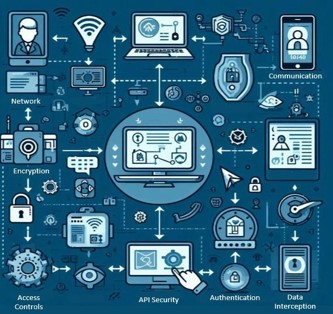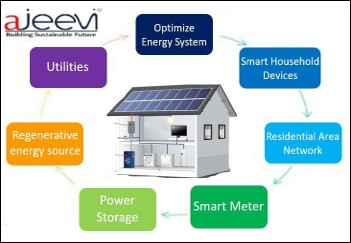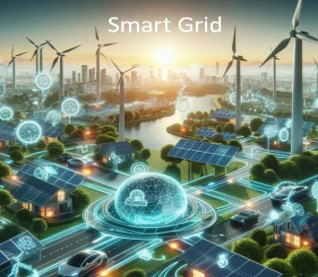Resources-> Blogs ->Smart Energy



Summary:
The Smart Energy Industry is undergoing a profound transformation driven by advancements in technology like the Internet of Things (IoT), artificial intelligence (AI), and big data analytics. These innovations are reshaping traditional energy systems into more efficient, dependable, and sustainable networks. Key components of this transformation include IoT devices and smart meters, which enable real-time monitoring and control of energy consumption across the grid. By collecting and transmitting vast amounts of data, these devices facilitate improved energy management, lower operational costs, and enhanced resource distribution efficiency. For instance, IoT-enabled smart grids can adjust energy flows dynamically based on consumption patterns, reducing waste and bolstering infrastructure resilience. Moreover, IoT plays a crucial role in integrating renewable energy sources such as solar and wind power into the grid. Smart energy management systems leverage IoT to ensure a steady supply of renewable energy while optimizing system performance through monitoring and predictive maintenance.
Powering the Future: IoT in Smart Energy Solutions

IoT-enabled smart metres lead the smart energy revolution. These gadgets provide real-time data on energy consumption, allowing consumers and utilities to monitor and optimise energy use with unparalleled precision. Smart metres minimise the need for human readings and minimise billing problems by automatically relaying data to utilities. Consumers can gain detailed insights into their energy usage habits using mobile apps or web portals, allowing them to make more educated decisions about their energy use. Smart metre data helps utilities balance demand, detect failures immediately, and prepare for infrastructure upgrades.
Smart Grids:which use IoT technology, are a substantial advancement over traditional energy distribution networks. Smart grids use IoT sensors and advanced communication networks to dynamically react to changes in energy demand and supply, thereby increasing grid stability and resilience. These grids can better integrate renewable energy sources like solar and wind by regulating power generation fluctuations. IoT-enabled smart grids also provide bidirectional connectivity, enabling real-time engagement between the utility and its customers. This feature is critical for demand response programmes, which pay consumers to cut or shift their energy usage during peak hours, therefore stabilising the grid and minimising the need for new power plants.
Connected Devices:The growth of IoT devices in homes and workplaces is changing energy consumption. Smart thermostats, smart plugs, and home automation systems enable customers to manage their energy consumption remotely via smartphones or voice-activated assistants. For example, smart thermostats remember user preferences and automatically alter heating and cooling schedules to maximise comfort and energy savings. Home automation systems can turn off lights, appliances, and other equipment when they are not in use, which helps to reduce energy waste. Furthermore, these connected devices can receive signals from the utility to minimise power use during peak demand hours, so improving overall energy efficiency and cost savings. IoT integrates with other smart home gadgets to form a cohesive ecosystem in which energy usage is seamlessly optimised.
The use of Internet of Things (IoT) technology into the energy sector is a big step towards creating smarter, more efficient, and sustainable energy systems. IoT enables real-time monitoring and control, resulting in predictive maintenance, improved grid management, and optimised energy consumption. As IoT devices and sensors become more sophisticated, they provide unprecedented data collection and analysis capabilities, pushing energy management innovation. Furthermore, IoT-driven smart grids help to integrate renewable energy sources seamlessly, allowing for more precise supply and demand balancing. This leads to increased energy efficiency and a lower environmental effect, which aligns with global sustainability goals. The synergy between IoT and energy systems also provides users with better insights and control over their energy usage, enabling a more proactive and educated approach to energy conservation.
Ajeevi Technologies provides innovative and customized solutions in the areas of smart cities, internet of things (IoT), and sustainable development which include:
IoT-enabled Solutions
Ajeevi Technologies has developed IoT-enabled solutions to improve the functioning of cities. Ajeevi offers a range of solutions like smart parking, smart street lighting, smart waste management, and smart water management systems that are connected to the internet and can be monitored and managed remotely.
Sustainable Energy Solutions
Ajeevi Technologies is focused on developing sustainable energy solutions for smart cities and provide solutions that are energy-efficient and rely on renewable energy sources such as solar and wind power.
Data Analytics
Ajeevi Technologies uses data analytics to gather and analyze data to provide insights into the functioning of the city. Ajeevi uses this information to optimize operations, improve service delivery, and make data-driven decisions.
Citizen Engagement
Ajeevi Technologies is committed to citizen engagement and involving citizens in the planning and implementation of smart city solutions. Ajeevi has developed platforms for citizen engagement, including mobile apps, web portals, and social media, which enable citizens to provide feedback, report issues, and participate in decision-making.
Overall, Ajeevi Technologies’ contributions to smart city solutions are aimed at making cities more sustainable, efficient, and citizen-friendly. Our innovative solutions, focus on sustainability and citizen engagement make them a valuable player in the smart city space. http://www.ajeevi.com


Android Handheld UHF Reader
Automatic Boom Barrier
Automatic Number Plate Reader Camera
Bin Level Sensor
Bio Metrics Machine
Bullet Camera Live
Chlorine Sensor
Data Transmission Unit
Emergency Call Box
Environment Sensor
Face Recognition
Flood Sensor
Fuel Sensor
Galvanized Iron Pole
Gi-Pole
GPS
GPS-AIS140
Handheld HF Reader
Handheld UHF Reader
PTZ Camera
Public Address Speaker
Public Address System
Hydraulic Boom Barrier
IP Bullet Camera
IRIS
Magnetic Sensor
Network Rack
Network Video Recorder
Panic Button
Parking Entry Exit UHF Reader Vehicle Mounted UHF Reader
Passenger information systems
Ph Sensor
Refrigerator Sensor
RFID Tag – HF
RFID Tag – UHF
RFID Tag Metal – UHF
Smart Kiosk
Smart Pole
Soil Sensor
Drainage Sensor
Temperature Sensor
Turbidity Sensor
Ultrasonic Flow Meter Variable Sign Board Weigh Bridge Entry Exit Reader
Thanks for ” Downloading”, “Discovering”, “AJEEVI Products”, hit the submit button requisite information will be in your email box shortly.
Ajeevi Offer “Enterprise IoT Solutions” with in-house R&D, Capability of manufacturing IOT devices.
505, Tower A-1, Corporate Park
Noida 201301, Uttar Pradesh India
presales@ajeevi.com
+91-9654323500